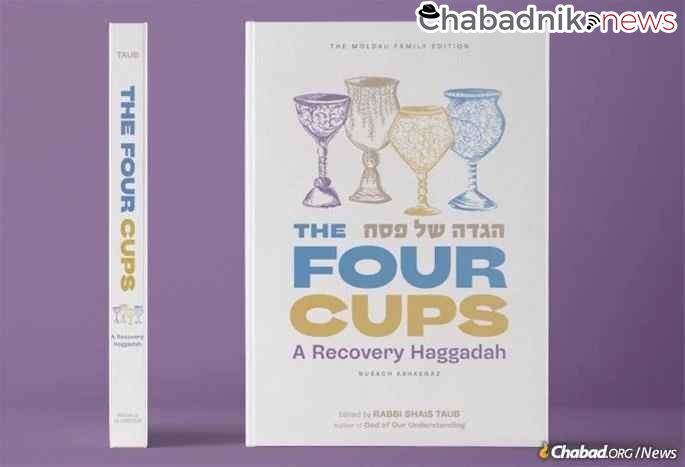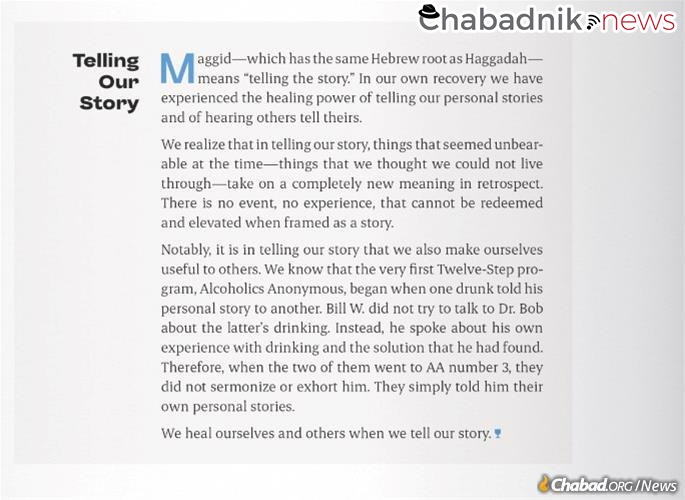Rabbi Shais Taub’s valuable new spiritual resource for the recovering alcoholic and addict

For Jews around the world, Passover often comes with the stresses of cooking, cleaning and preparation that begins weeks before the holiday. But for those with a history of alcohol and drug dependency, the holiday comes with its own unique challenges as Jewish men and women prepare to navigate the Seder night, which is centered on the four famous cups of wine.
However, as Rabbi Shais Taub, editor of The Four Cups: A Recovery Haggadah shares with Chabad.org, “the Seder doesn’t have to be a missed experience for those in recovery.” Rather, for those dealing with addiction to mood-altering substances, the spiritual message of liberation from enslavement behind the four cups may even be more meaningful than it is to most people.
The Four Cups: A Recovery Haggadah was released two weeks ago, just in time for the coming holiday. The Haggadah brings the collective voice of alcoholics, as it guides readers through the Passover story, focusing on the deep meaning that the Passover story holds for those grappling with addiction and recovery.
Both Taub, the Haggadah’s editor, and Rabbi Nechemia Schusterman, co-director of Chabad of Peabody, Mass., who is the “producer” behind the work, were inspired through their own personal connections within the world of recovery.
“The day after Passover last year, in 2021, I got a call from Nechemia asking me to take part in a project developing a Haggadah for recovered addicts. The themes are so pertinent to the AA [Alcoholics Anonymous] community, and maybe even more than for others,” says Taub.
By no coincidence, Taub had thought of the same idea himself 11 years prior and had even bought the domain to the website, fourcups.org. Within a year of working tirelessly on Four Cups, it was released on Rosh Chodesh Nissan and has already begun distribution among Chabad-Lubavitch emissaries across the country. With the help of generous sponsors, every Chabad center will now offer it as a resource for its members.
While the Haggadah itself was published and compiled by Taub and Schusterman, the book is authored using anecdotes, personal histories and sharing by alcoholics that Taub has collected over the years. Their collective voice guides the reader by sharing personal experiences and resonance throughout the Haggadah. In keeping with the classic AA format, the Haggadah is written in plural, as “we.” The insight of one holds the wisdom of many, and Schusterman and Taub hope all those who identify will join in the shared experience.

From Personal Slavery to Personal Redemption
“There is a deep personal resonance for recovered addicts within the story of liberation. Jews in recovery find the parallel to their own personal lives uncanny,” shares Rabbi Taub. “Just as the Jewish nation found salvation in their deepest surrender to G‑d, for those on the journey towards recovery, it is that same surrender to faith that truly sets us free.”
It was through the total dissolution of control and the complete acknowledgment that human strength alone could not save the Jewish people that led the Jewish nation to find G‑d’s salvation. Similarly, as Taub explains, one of the deepest points of growth in the 12-step recovery process is the realization that an individual’s personal willpower is not enough, and that people need the partnership of a Higher Power to help deliver them from the bondage of their own egos.
“We step into a place of humility, which the ‘deflated’ matzah represents on Seder night, and learn to rely on the universe’s unlimited source of power: G‑d,” said the rabbi.

Taub sees the four cups of wine as the endless flow of blessing from above, representing the journey towards ultimate freedom—and for those struggling with alcohol dependency, a journey towards recovery. “Someone who personally identifies with the Exodus story will drink those blessings with deep intention and mindfulness. Even with grape juice, the symbolism is felt, and may even enhance the experience.”
Although this Haggadah primarily focuses on the experience of the alcoholic, the redemption story of Passover is relevant to all those in recovery, as it follows the primary 12-step process. The Passover redemption is felt more potently—more embodied—by those who have journeyed into the depths to reveal a personal freedom themselves.
Passover may be the most highly celebrated holiday among Jews across the world, and Taub and Schusterman hope that the Haggadah becomes a valuable resource for community members, as well as a means of increasing awareness and sensitivity surrounding addiction. They envision a future that holds less stigma around recovering addicts. To that end, they want their work to encourage recovering addicts to contribute their unique insight on Seder night.
“The Four Cups: A Recovery Haggadah” is available for purchase at: fourcups.org.



